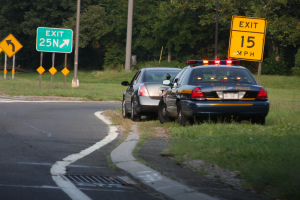 In an opinion released early this week the Supreme Court of the United States has yet again ruled against protecting individuals rights and has given law enforcement even more power to harass and torment the masses. The case referred to is Heien v. North Carolina, and the summary of the case is as follows:
In an opinion released early this week the Supreme Court of the United States has yet again ruled against protecting individuals rights and has given law enforcement even more power to harass and torment the masses. The case referred to is Heien v. North Carolina, and the summary of the case is as follows:
“The Court affirmed the decision of the Supreme Court of North Carolina. The Court held that the police officer’s mistake of law was reasonable and there was a reasonable suspicion justifying the stop under the Fourth Amendment. The police officer stopped the car for having only one working brake light and in a subsequent search the officer found cocaine. However, North Carolina law requires only a single functioning brake light.”
Unlawful Search and Seizure
The starting point for a case like this is the Fourth Amendment to the United States Constitution which gives individuals the right to be “secure in their persons, houses, papers, and effects” and protects individuals from unlawful searches and seizures. Due to the Fourth Amendment law enforcement must have a reasonable articulable suspicion of illegal activity to pull someone over on the roadway and initiate a traffic stop. What this means is that a cop can’t just pull someone over because they feel like it, they must be able to point to some evidence of why they think the individual in the vehicle is breaking the law.This seems like an easy enough rule that is aimed at protecting citizens from unlawful police intrusions but of course that is not the reality of things. The difficulty with this rule is there are not safety measure to insure that law enforcement are telling the truth, for example, an officer can state that the individual was ‘following too close’; committed an ‘unlawful lane change’, ‘failed to yeild’, or they can simply state that the individual was ‘speeding.’ Any of these excuses for pulling someone over are valid and almost entirely impossible to prove the validity thereof. So in practice what this rule means is that if a cop really wants to pull someone over because they look ‘suspicious’ or because they’re of a certain racial class, then all they have to do is make up some offense that they believe they are committing.
Mistakes of Fact and Law
Moving on from the possibility of dishonest law enforcement, there is the next gray area of mistake. What happens if the officer simply makes a mistake about what he thought was a violation of the law and once he has the individual stopped he realizes his mistake? There are two possible mistakes here, the first is a mistake of fact, and the second is a mistake of law. The issue of mistake of fact was handled by the Utah Supreme Court in State v. Morris in which the court determined that when a law enforcement official makes a mistake of fact upon which a traffic stop is based then the office is to advise the individual of the mistake. The important part however is that the court stated that law enforcement can still request license and registration and can still extend the stop based on newly obtained reasonable suspicion even though the original basis for the stop was a mistake. The example of this from the Morris case is that the officer thought the vehicle was not registered but after the stop was conducted he realized there was a temporary tag on the back window.
A mistake of law on the other hand is when a law enforcement official thinks an action is illegal when it is in fact not illegal. This is what SCOTUS encountered in Heien v. North Carolina. The officer in that case pulled over an individual because the person had a brake light out, however, the law of North Carolina only requires one brake light, so the individual was not doing anything illegal. In the past a mistake of law was not sufficient to provide reasonable suspicion but now under SCOTUS’ new decision a mistake of law is allowed if it was a reasonable mistake. Reasonable of course is a very flexible term and it will most likely be determined on a case by case basis but the main takeaway from this should be that officers are no longer required to know the law as well as they should to be able to get passed the Fourth Amendment. Sadly, the idea of being protected from unlawful searches and seizures is starting to appear more and more like an overly idealistic and Utopian theory that we will never truly enjoy.




